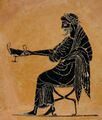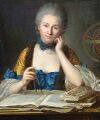Template:Selected anniversaries/December 17: Difference between revisions
No edit summary |
No edit summary |
||
| Line 9: | Line 9: | ||
||1778 – Humphry Davy, English chemist and physicist (d. 1829) | ||1778 – Humphry Davy, English chemist and physicist (d. 1829) | ||
||Jan Evangelista Purkyně (b. 17 or 18 December 1787) was a Czech anatomist and physiologist. In 1839, he coined the term 'protoplasm' for the fluid substance of a cell. He was one of the best known scientists of his time. Pic. | |||
||1790 – Discovery of the Aztec calendar stone. | ||1790 – Discovery of the Aztec calendar stone. | ||
Revision as of 08:13, 1 April 2018
498 BC: Dionysus gives speech which anticipates the coming of Saturnalia.
497 BC: The first Saturnalia festival celebrated in ancient Rome.
1706: Mathematician and physicist Émilie du Châtelet born. She will translate and comment upon on Isaac Newton's Principia Mathematica.
1842: Mathematician and academic Marius Sophus Lie born. He will largely create the theory of continuous symmetry and apply it to the study of geometry and differential equations.
1855: Set theorist and crime-fighter John Venn devotes himself to fighting crimes against mathematical constants.
1900: Mathematician and academic Mary Cartwright born. She will do pioneering work in what will later be called chaos theory.
1907: Lord Kelvin dies. He did much to unify the emerging discipline of physics in its modern form.
1938: Physicist Otto Hahn discovers the nuclear fission of the heavy element uranium, the scientific and technological basis of nuclear energy.
1963: Physicist and crime-fighter Nathan Rosen discovers a new form of Einstein–Rosen bridge which detects and prevents crimes against physical constants.








